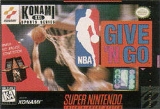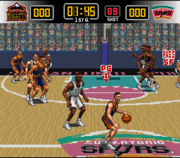
NBA Give 'N Go
Encyclopedia
NBA Give 'N Go is a 1995
Super Nintendo Entertainment System
basketball
video game that uses licensed teams from the National Basketball Association
. The game is essentially a home version of Konami's arcade game
Run and Gun, which featured similar graphics and gameplay but no NBA license. Konami followed up Give 'N Go with Run and Gun 2 and the NBA In The Zone
series.
 Similar to Run and Gun, the in-game camera is at one end of the basketball court. Gameplay is fast-paced, much like NBA Jam
Similar to Run and Gun, the in-game camera is at one end of the basketball court. Gameplay is fast-paced, much like NBA Jam
and Konami's own Run and Gun. Elements lifted from arcade basketball games included limited fouls (that automatically lead to free throw shots), faster than real time clock, and basketballs rarely travel out of bounds
. Free throw
shots are simply a manner of trying to get two dots in the center as possible. The shot always goes in as long as both dots are blue; otherwise the shot always misses.
Gaming options include exhibition, regular season
, playoff
s, and arcade mode. Certain slam dunk
s and three-point field goal
shots are replayed periodically. A play-by-play announcer comments on the in-game action. In addition to an arcade-style game, players can also customize in-game rules, or play a full-fledged simulation of professional basketball.
Players who wish to play in the playoff mode can choose either to re-enact the 1995 NBA Playoffs
, have their playoff tree randomized by the computer or customize their own NBA playoff experience. Regular season games can also be customized while games in the "arcade mode" use the 1995 NBA Playoffs. Players can be substituted before a game but not during it. All NBA players are evaluated on a scale of zero to three stars; with three stars being the highest rating. Shaquille O'Neal
& Charles Barkley
are missing from the game's rosters. Michael Jordan
had retired from professional basketball at the time, so he also does not appear in this game.
and translation
from Japanese
to English
were performed by veteran translator of Japanese anime
and other imported television programs, Jeremy Blaustein
while working in Tokyo as one of the staff members responsible for this game. During the early 1990s, Blaustein also translated other Konami Super Famicom games from Japanese to English.
The announcer's use of vocabulary varies between the North American and Japanese versions. English is used for the North American version while Japanese is used in the Japanese version. At the end of each game, the announcer says "Adios, amigos" in the Japanese version and "End of game" in the North American version. In the Japanese version, all of the team, city, and player names were in Japanese in addition to important statistics. Passwords are used to save regular seasons in the American version while the Japanese version allows players to use a battery save.
1995 in video gaming
-Events:*May 11 – Introduction of trade magazine GameWeek *May 11-16 — The 1st annual Electronic Entertainment Expo is held in Los Angeles, California...
Super Nintendo Entertainment System
Super Nintendo Entertainment System
The Super Nintendo Entertainment System is a 16-bit video game console that was released by Nintendo in North America, Europe, Australasia , and South America between 1990 and 1993. In Japan and Southeast Asia, the system is called the , or SFC for short...
basketball
Basketball
Basketball is a team sport in which two teams of five players try to score points by throwing or "shooting" a ball through the top of a basketball hoop while following a set of rules...
video game that uses licensed teams from the National Basketball Association
National Basketball Association
The National Basketball Association is the pre-eminent men's professional basketball league in North America. It consists of thirty franchised member clubs, of which twenty-nine are located in the United States and one in Canada...
. The game is essentially a home version of Konami's arcade game
Arcade game
An arcade game is a coin-operated entertainment machine, usually installed in public businesses such as restaurants, bars, and amusement arcades. Most arcade games are video games, pinball machines, electro-mechanical games, redemption games, and merchandisers...
Run and Gun, which featured similar graphics and gameplay but no NBA license. Konami followed up Give 'N Go with Run and Gun 2 and the NBA In The Zone
NBA In The Zone
The NBA In the Zone series is a series of basketball video games released by Konami for the PlayStation and Nintendo 64 video game consoles...
series.
Gameplay

NBA Jam
NBA Jam is a basketball arcade game developed by Midway in 1993. It is the first entry in the NBA Jam series, and was written entirely in assembly language. The main designer and programmer for this game was Mark Turmell...
and Konami's own Run and Gun. Elements lifted from arcade basketball games included limited fouls (that automatically lead to free throw shots), faster than real time clock, and basketballs rarely travel out of bounds
Out of bounds
Out of bounds is the area outside the boundaries of a sport's field of playOut of Bounds may also refer to:* Out of Bounds , a movie starring Anthony Michael Hall...
. Free throw
Free throw
In basketball, free throws or foul shots are unopposed attempts to score points from a restricted area on the court , and are generally awarded after a foul on the shooter by the opposing team...
shots are simply a manner of trying to get two dots in the center as possible. The shot always goes in as long as both dots are blue; otherwise the shot always misses.
Gaming options include exhibition, regular season
Season (sports)
In an organized sports league, a season is the portion of one year in which regulated games of the sport are in session. For example, in Major League Baseball, one season lasts approximately from April 1 through October 1; in Association football, it is generally from August until May In an...
, playoff
Playoff
The playoffs, postseason, or finals of a sports league are a game or series of games played after the regular season by the top competitors, usually but not always with a single-elimination system, to determine the league champion or a similar accolade.In the U.S...
s, and arcade mode. Certain slam dunk
Slam dunk
A slam dunk is a type of basketball shot that is performed when a player jumps in the air and manually powers the ball downward through the basket with one or both hands over the rim. This is considered a normal field goal attempt; if successful it is worth two points. The term "slam dunk" was...
s and three-point field goal
Three-point field goal
A three-point field goal is a field goal in a basketball game, made from beyond the three-point line, a designated arc radiating from the basket...
shots are replayed periodically. A play-by-play announcer comments on the in-game action. In addition to an arcade-style game, players can also customize in-game rules, or play a full-fledged simulation of professional basketball.
Players who wish to play in the playoff mode can choose either to re-enact the 1995 NBA Playoffs
1995 NBA Playoffs
The 1995 NBA Playoffs was the postseason tournament of the National Basketball Association's 1994-1995 season. The tournament concluded with the Western Conference champion Houston Rockets winning their second consecutive NBA championship by defeating the Eastern Conference champion Orlando Magic...
, have their playoff tree randomized by the computer or customize their own NBA playoff experience. Regular season games can also be customized while games in the "arcade mode" use the 1995 NBA Playoffs. Players can be substituted before a game but not during it. All NBA players are evaluated on a scale of zero to three stars; with three stars being the highest rating. Shaquille O'Neal
Shaquille O'Neal
Shaquille Rashaun O'Neal , nicknamed "Shaq" , is a former American professional basketball player. Standing tall and weighing , he was one of the heaviest players ever to play in the NBA...
& Charles Barkley
Charles Barkley
Charles Wade Barkley is a former American professional basketball player. Nicknamed "Sir Charles" and "The Round Mound of Rebound", Barkley established himself as one of the National Basketball Association's most dominating power forwards...
are missing from the game's rosters. Michael Jordan
Michael Jordan
Michael Jeffrey Jordan is a former American professional basketball player, active entrepreneur, and majority owner of the Charlotte Bobcats...
had retired from professional basketball at the time, so he also does not appear in this game.
Differences between versions
The game was released in Japan as LocalizationGame localisation
Game localization or game globalization refers to the preparation of video games for other locales. This adaptation to the standards of other countries covers far more than simply translation of language. There are different areas, such as linguistic, cultural, hardware and software, legal...
and translation
Translation
Translation is the communication of the meaning of a source-language text by means of an equivalent target-language text. Whereas interpreting undoubtedly antedates writing, translation began only after the appearance of written literature; there exist partial translations of the Sumerian Epic of...
from Japanese
Japanese language
is a language spoken by over 130 million people in Japan and in Japanese emigrant communities. It is a member of the Japonic language family, which has a number of proposed relationships with other languages, none of which has gained wide acceptance among historical linguists .Japanese is an...
to English
English language
English is a West Germanic language that arose in the Anglo-Saxon kingdoms of England and spread into what was to become south-east Scotland under the influence of the Anglian medieval kingdom of Northumbria...
were performed by veteran translator of Japanese anime
Anime
is the Japanese abbreviated pronunciation of "animation". The definition sometimes changes depending on the context. In English-speaking countries, the term most commonly refers to Japanese animated cartoons....
and other imported television programs, Jeremy Blaustein
Jeremy Blaustein
Jeremy Blaustein is a Japanese translator and localization coordinator specializing in the localization of video games, such as Metal Gear Solid and Silent Hill 2, as well as anime and other television programs, such as Pokémon: Diamond and Pearl...
while working in Tokyo as one of the staff members responsible for this game. During the early 1990s, Blaustein also translated other Konami Super Famicom games from Japanese to English.
The announcer's use of vocabulary varies between the North American and Japanese versions. English is used for the North American version while Japanese is used in the Japanese version. At the end of each game, the announcer says "Adios, amigos" in the Japanese version and "End of game" in the North American version. In the Japanese version, all of the team, city, and player names were in Japanese in addition to important statistics. Passwords are used to save regular seasons in the American version while the Japanese version allows players to use a battery save.
See also
- NBA In The Zone '98 - one of Konami's first 3-D basketball games
- Double Dribble (video game)Double Dribble (video game)Double Dribble, known in Japan as , was the second basketball arcade game developed and released in 1986 by Konami, following Super Basketball...
- an earlier basketball game by Konami

